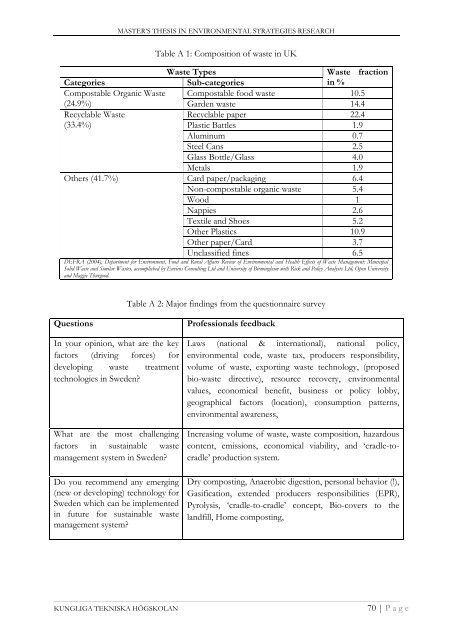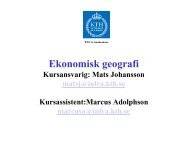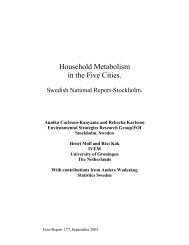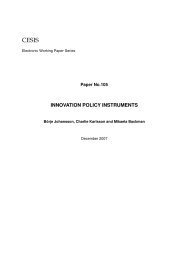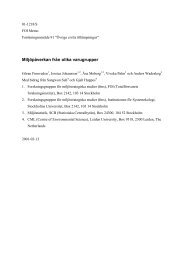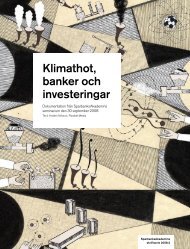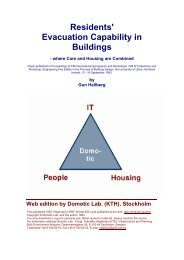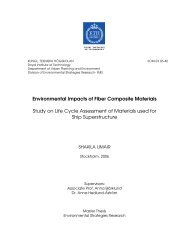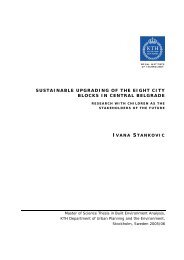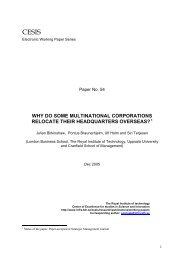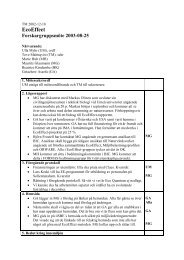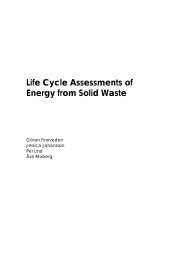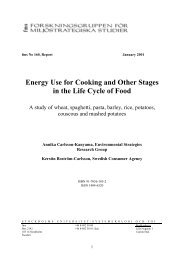Technical Development of Waste Sector in Sweden: Survey
Technical Development of Waste Sector in Sweden: Survey
Technical Development of Waste Sector in Sweden: Survey
Create successful ePaper yourself
Turn your PDF publications into a flip-book with our unique Google optimized e-Paper software.
MASTER’S THESIS IN ENVIRONMENTAL STRATEGIES RESEARCH<br />
Table A 1: Composition <strong>of</strong> waste <strong>in</strong> UK<br />
<strong>Waste</strong> Types<br />
<strong>Waste</strong> fraction<br />
Categories<br />
Sub-categories<br />
<strong>in</strong> %<br />
Compostable Organic <strong>Waste</strong> Compostable food waste 10.5<br />
(24.9%)<br />
Garden waste 14.4<br />
Recyclable <strong>Waste</strong><br />
(33.4%)<br />
Recyclable paper 22.4<br />
Plastic Battles 1.9<br />
Alum<strong>in</strong>um 0.7<br />
Steel Cans 2.5<br />
Glass Bottle/Glass 4.0<br />
Metals 1.9<br />
Others (41.7%) Card paper/packag<strong>in</strong>g 6.4<br />
Non-compostable organic waste 5.4<br />
Wood 1<br />
Nappies 2.6<br />
Textile and Shoes 5.2<br />
Other Plastics 10.9<br />
Other paper/Card 3.7<br />
Unclassified f<strong>in</strong>es 6.5<br />
DEFRA (2004), Department for Environment, Food and Rural Affairs Review <strong>of</strong> Environmental and Health Effects <strong>of</strong> <strong>Waste</strong> Management: Municipal<br />
Solid <strong>Waste</strong> and Similar <strong>Waste</strong>s, accomplished by Enviros Consult<strong>in</strong>g Ltd and University <strong>of</strong> Birm<strong>in</strong>gham with Risk and Policy Analysts Ltd, Open University<br />
and Maggie Thurgood.<br />
Table A 2: Major f<strong>in</strong>d<strong>in</strong>gs from the questionnaire survey<br />
Questions<br />
In your op<strong>in</strong>ion, what are the key<br />
factors (driv<strong>in</strong>g forces) for<br />
develop<strong>in</strong>g waste treatment<br />
technologies <strong>in</strong> <strong>Sweden</strong>?<br />
What are the most challeng<strong>in</strong>g<br />
factors <strong>in</strong> susta<strong>in</strong>able waste<br />
management system <strong>in</strong> <strong>Sweden</strong>?<br />
Do you recommend any emerg<strong>in</strong>g<br />
(new or develop<strong>in</strong>g) technology for<br />
<strong>Sweden</strong> which can be implemented<br />
<strong>in</strong> future for susta<strong>in</strong>able waste<br />
management system?<br />
Pr<strong>of</strong>essionals feedback<br />
Laws (national & <strong>in</strong>ternational), national policy,<br />
environmental code, waste tax, producers responsibility,<br />
volume <strong>of</strong> waste, export<strong>in</strong>g waste technology, (proposed<br />
bio-waste directive), resource recovery, environmental<br />
values, economical benefit, bus<strong>in</strong>ess or policy lobby,<br />
geographical factors (location), consumption patterns,<br />
environmental awareness,<br />
Increas<strong>in</strong>g volume <strong>of</strong> waste, waste composition, hazardous<br />
content, emissions, economical viability, and ‘cradle-tocradle’<br />
production system.<br />
Dry compost<strong>in</strong>g, Anaerobic digestion, personal behavior (!),<br />
Gasification, extended producers responsibilities (EPR),<br />
Pyrolysis, ‘cradle-to-cradle’ concept, Bio-covers to the<br />
landfill, Home compost<strong>in</strong>g,<br />
KUNGLIGA TEKNISKA HÖGSKOLAN<br />
70 | Page


